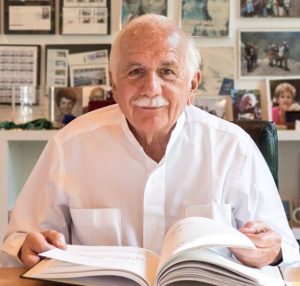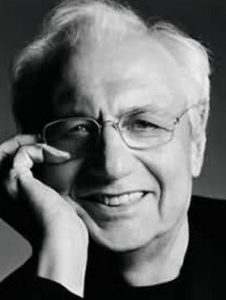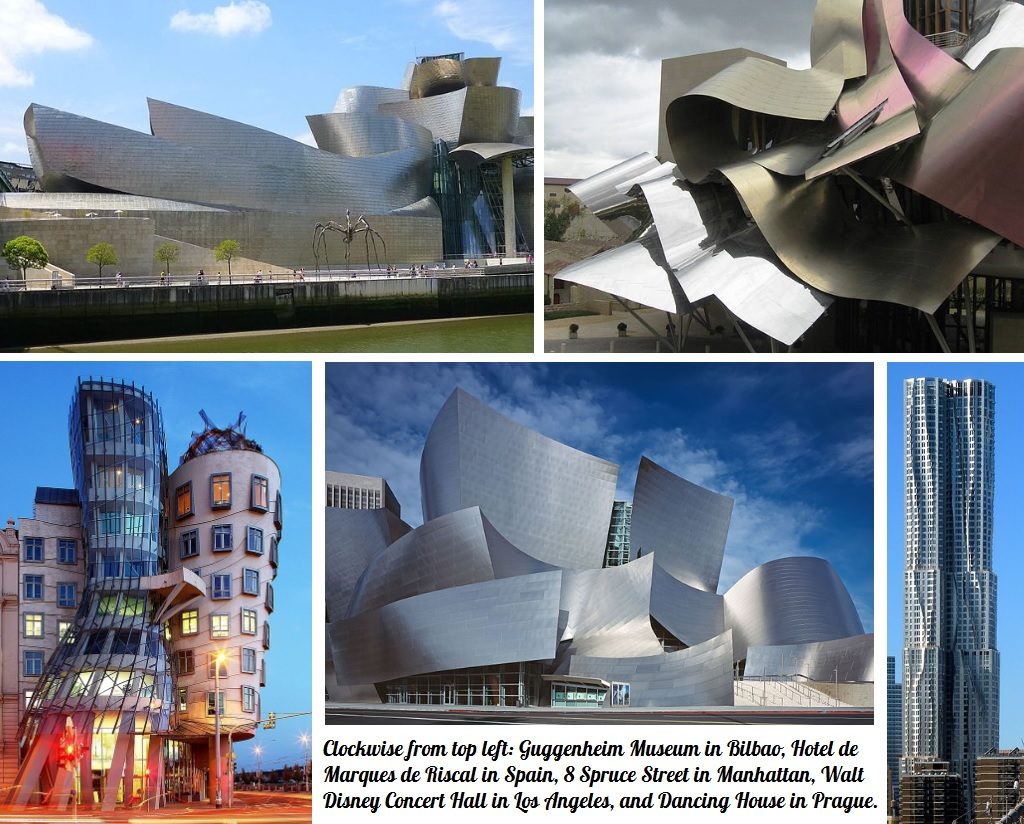Visionary Architect
 Moshe Safdie (b. 1938) was born in Haifa to a Mizrachi Jewish family originally from Syria. He grew up on a kibbutz where he was a beekeeper and goatherd. When he was 15, the family moved to Montreal, Canada. Safdie went on to study architecture at McGill University. For his thesis, he came up with the idea of 3D, prefabricated modular units. Safdie quickly made a name for himself as a young architect and, at just 23, was invited to design Habitat 67 during Montreal’s World Expo. In 1970, Safdie opened a branch of his firm in Jerusalem to focus on restoring the Old City and building up the new city post-reunification. He designed the famous Porat Yosef Yeshiva (originally the vision of the great Ben Ish Chai), the beautiful Mamilla Center, as well as Yad Vashem, and Ben Gurion International Airport. Safdie achieved international renown, and went on to design some of the most iconic buildings in the world (see below). This includes the Marina Bay Sands in Singapore, the National Gallery of Canada, and the world’s longest “horizontal skyscraper” in China. Meanwhile, Safdie has taught at Harvard’s Graduate School of Design, and directed it for a number of years. He has also published a dozen books, and has been featured in six films. Today, Safdie Architects has offices in Boston, Jerusalem, Toronto, Shanghai, and Singapore. Safdie is still deeply involved, and maintains a research fellowship at his firm to develop new architectural ideas and futuristic projects. He has won countless awards, including the Order of Canada, the Wolf Prize in Architecture, and multiple honorary doctorates. The Moshe Safdie Archive at McGill University is among the largest architectural collections in the world, with over 140,000 drawings, 100,000 photos, and over 2000 sketches.
Moshe Safdie (b. 1938) was born in Haifa to a Mizrachi Jewish family originally from Syria. He grew up on a kibbutz where he was a beekeeper and goatherd. When he was 15, the family moved to Montreal, Canada. Safdie went on to study architecture at McGill University. For his thesis, he came up with the idea of 3D, prefabricated modular units. Safdie quickly made a name for himself as a young architect and, at just 23, was invited to design Habitat 67 during Montreal’s World Expo. In 1970, Safdie opened a branch of his firm in Jerusalem to focus on restoring the Old City and building up the new city post-reunification. He designed the famous Porat Yosef Yeshiva (originally the vision of the great Ben Ish Chai), the beautiful Mamilla Center, as well as Yad Vashem, and Ben Gurion International Airport. Safdie achieved international renown, and went on to design some of the most iconic buildings in the world (see below). This includes the Marina Bay Sands in Singapore, the National Gallery of Canada, and the world’s longest “horizontal skyscraper” in China. Meanwhile, Safdie has taught at Harvard’s Graduate School of Design, and directed it for a number of years. He has also published a dozen books, and has been featured in six films. Today, Safdie Architects has offices in Boston, Jerusalem, Toronto, Shanghai, and Singapore. Safdie is still deeply involved, and maintains a research fellowship at his firm to develop new architectural ideas and futuristic projects. He has won countless awards, including the Order of Canada, the Wolf Prize in Architecture, and multiple honorary doctorates. The Moshe Safdie Archive at McGill University is among the largest architectural collections in the world, with over 140,000 drawings, 100,000 photos, and over 2000 sketches.
*November is Mizrachi Heritage Month.*
Moshe Safdie at TED: How to Reinvent the Apartment Building
Words of the Week
Woe to mankind! For they see, but do not know what they see; they stand, but do not know upon what they stand.
– Rabbi Yose (Talmud, Chagigah 12b)
Some of Moshe Safdie’s best-known projects, clockwise from top left: Porat Yosef Yeshiva in Jerusalem’s Old City, Kauffman Center in Kansas City, National Gallery of Canada in Ottawa, Habitat 67 in Montreal, Jewel Changqi Airport in Singapore, and Marina Bay Sands in Singapore.


 Lawrence M. Tanenbaum (b. 1945) was born in Toronto, the grandson of religious Polish-Jewish immigrants. His father was a real estate tycoon and the founder and owner of York Steel Construction. Tanenbaum studied economics at Cornell University, where he managed the school’s hockey team. Upon graduating, he became the general manager of Kilmer Van Nostrand, a construction company that his father had recently bought out. Tanenbaum expanded the company rapidly. Among their many projects across the Americas are the Toronto, Atlanta, Miami, and Calgary train and subway networks. After a merger with another company in 1984, Tanenbaum became the CEO of Canada’s largest road paving company. Meanwhile, he created two new subdivisions for Kilmer: its Developments wing which is a leading Canadian real estate firm, and Kilmer Sports, for which Tanenbaum is most famous. Kilmer Sports has a 25% share of Maple Leafs Sports & Entertainment Ltd., and Tanenbaum is the chairman of both the Toronto Maple Leafs hockey team and the Toronto Raptors basketball team. The former is among the most valuable sports clubs in the world, while the latter won the NBA Championship last week for the first time in its history. In fact, Tanenbaum played an instrumental role in bringing a professional basketball team to Toronto. Although he lobbied the NBA for years, the contract was ultimately awarded to another businessman. Undeterred, Tanenbaum vowed to buy it out, and did so in 1998 with the team having struggled tremendously in its first years. Tanenbaum quickly turned its fortunes around (together with Vince Carter, who was drafted that same year.) Tanenbaum is a big sports fan himself, and goes to as many Leafs and Raptors games as he can. MLSE also owns the Toronto Argonauts, Toronto FC, and two more teams, making it Canada’s largest sports company, and one of the largest in the world. Last year, Tanenbaum (with a partner) bought the rights to bottle and distribute Coca-Cola in Canada. Tanenbaum and his family are huge philanthropists, donating countless millions to schools, hospitals, and charities. Among his largest donations are $60 million to Toronto’s Mount Sinai Hospital, $20 million to Montreal’s Neurological Institute and Hospital, $5 million to the University of Toronto, and $50 million to the UJA. He is a co-founder of the Centre for Israel and Jewish Affairs. Tanenbaum was awarded the Order of Canada in 2007. He plans to take the Toronto Raptors on an all-expenses paid trip to Israel as a victory present.
Lawrence M. Tanenbaum (b. 1945) was born in Toronto, the grandson of religious Polish-Jewish immigrants. His father was a real estate tycoon and the founder and owner of York Steel Construction. Tanenbaum studied economics at Cornell University, where he managed the school’s hockey team. Upon graduating, he became the general manager of Kilmer Van Nostrand, a construction company that his father had recently bought out. Tanenbaum expanded the company rapidly. Among their many projects across the Americas are the Toronto, Atlanta, Miami, and Calgary train and subway networks. After a merger with another company in 1984, Tanenbaum became the CEO of Canada’s largest road paving company. Meanwhile, he created two new subdivisions for Kilmer: its Developments wing which is a leading Canadian real estate firm, and Kilmer Sports, for which Tanenbaum is most famous. Kilmer Sports has a 25% share of Maple Leafs Sports & Entertainment Ltd., and Tanenbaum is the chairman of both the Toronto Maple Leafs hockey team and the Toronto Raptors basketball team. The former is among the most valuable sports clubs in the world, while the latter won the NBA Championship last week for the first time in its history. In fact, Tanenbaum played an instrumental role in bringing a professional basketball team to Toronto. Although he lobbied the NBA for years, the contract was ultimately awarded to another businessman. Undeterred, Tanenbaum vowed to buy it out, and did so in 1998 with the team having struggled tremendously in its first years. Tanenbaum quickly turned its fortunes around (together with Vince Carter, who was drafted that same year.) Tanenbaum is a big sports fan himself, and goes to as many Leafs and Raptors games as he can. MLSE also owns the Toronto Argonauts, Toronto FC, and two more teams, making it Canada’s largest sports company, and one of the largest in the world. Last year, Tanenbaum (with a partner) bought the rights to bottle and distribute Coca-Cola in Canada. Tanenbaum and his family are huge philanthropists, donating countless millions to schools, hospitals, and charities. Among his largest donations are $60 million to Toronto’s Mount Sinai Hospital, $20 million to Montreal’s Neurological Institute and Hospital, $5 million to the University of Toronto, and $50 million to the UJA. He is a co-founder of the Centre for Israel and Jewish Affairs. Tanenbaum was awarded the Order of Canada in 2007. He plans to take the Toronto Raptors on an all-expenses paid trip to Israel as a victory present.
